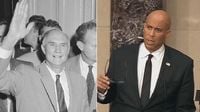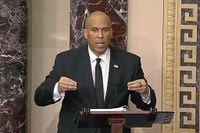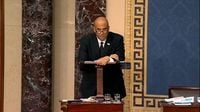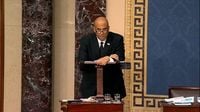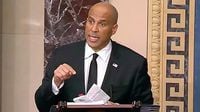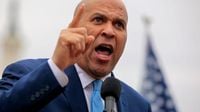Senator Cory Booker (D-N.J.) made history on April 1, 2025, by delivering the longest recorded speech in Senate history, surpassing the previous record held by Strom Thurmond. Beginning at 7 p.m. on March 31, 2025, Booker spoke for an astonishing 24 hours and 30 minutes, concluding his marathon address at 7:19 p.m. EDT on April 1, 2025. His speech was a passionate critique of President Donald Trump's policies and an urgent call to action against perceived threats to American democracy.
Booker’s speech, while lengthy, was not classified as a filibuster, which is typically intended to obstruct legislative action. Instead, it disrupted Senate business as it extended past noon on April 1, when the Senate was scheduled to reconvene. "These are not normal times in our nation," Booker declared at the outset of his speech. "And they should not be treated as such in the United States Senate." His remarks focused heavily on what he described as the GOP's threats to cut essential programs like Medicaid and Social Security.
The senator's record-breaking speech drew attention not only for its length but also for its historical context. Strom Thurmond, who held the previous record of 24 hours and 18 minutes during a 1957 filibuster against the Civil Rights Act, was invoked by Booker as he spoke. "To hate him is wrong, and maybe my ego got too caught up that if I stood here, maybe, maybe, just maybe, I could break this record of the man who tried to stop the rights upon which I stand," Booker noted, emphasizing that his presence on the Senate floor was a testament to the power of the people over the actions of any one individual.
During his speech, Booker engaged with fellow Democrats who posed questions, allowing him brief moments of respite while maintaining control of the floor. He had even arranged for a Senate page to remove his chair to eliminate the temptation to sit down. "I'm going to go for as long as I am physically able to go," he said, reflecting his commitment to the cause he was championing.
Booker’s marathon address highlighted numerous issues, including cuts to Social Security mandated by the Trump administration's Department of Government Efficiency, led by Elon Musk. He emphasized the urgency of the moment, stating, "The threats to the American people and American democracy are grave and urgent, and we all must do more to stand against them." His remarks also included personal stories from constituents affected by government cuts, showcasing the human impact of policy decisions.
As his speech continued, Booker referenced historical struggles for civil rights, asserting that progress is not achieved through silence but through active participation and resistance. He quoted civil rights icon John Lewis, saying, "Get in good trouble, necessary trouble, help redeem the soul of America." This sentiment resonated deeply as he urged his colleagues and constituents alike to recognize the critical nature of the current political landscape.
Booker’s effort was not just a personal milestone; it reflected a broader discontent within the Democratic Party, where many members have faced criticism for not being vocal enough against the Trump administration's policies. The senator's speech served as a rallying cry for a party grappling with the challenges of a deeply divided political environment.
Historically, the art of the filibuster has evolved within the Senate, allowing for extended debate on pressing issues. While Booker’s speech was technically not a filibuster, it certainly captured the spirit of one, drawing attention to significant legislative matters that impact millions of Americans. His speech ranks among the longest in Senate history, trailing only behind notable figures such as Alfonse D’Amato, who spoke for 23 hours and 30 minutes in 1986, and Wayne Morse, who delivered a 22-hour, 26-minute speech in 1953.
As the Senate floor remained open during Booker’s address, the implications of his speech extended beyond mere record-breaking. Political analysts noted that such an extensive display of commitment could influence upcoming votes and the overall direction of the Democratic Party. By taking a stand against Trump’s administration, Booker not only highlighted his passion for social justice but also positioned himself as a leading voice within the party.
In a world where political discourse often feels stagnant, Booker’s marathon speech brought a renewed sense of urgency and importance to the issues at hand. His ability to maintain focus and energy throughout the lengthy address has been praised by peers and constituents alike, marking a significant moment in Senate history.
As the dust settles from this record-breaking event, it remains to be seen how Booker’s actions will influence the Senate's agenda moving forward. His commitment to addressing the needs of his constituents and standing up against perceived injustices has solidified his role as a key figure in contemporary American politics.
In summary, Cory Booker’s historic speech not only broke a long-standing record but also served as a powerful testament to the ongoing fight for democracy and justice in America. By standing firm against policies he believes threaten the fabric of society, Booker has inspired many to consider the importance of their voices in the political arena.

